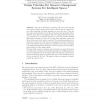Free Online Productivity Tools
i2Speak
i2Symbol
i2OCR
iTex2Img
iWeb2Print
iWeb2Shot
i2Type
iPdf2Split
iPdf2Merge
i2Bopomofo
i2Arabic
i2Style
i2Image
i2PDF
iLatex2Rtf
Sci2ools
140
click to vote
IWSAS
2001
Springer
2001
Springer
Design Principles for Resource Management Systems for Intelligent Spaces
The idea of ubiquitous computing and smart environments is no longer a dream and has long become a serious area of research and soon this technology will start entering our every day lives. There are two major obstacles that prevent this technology from spreading. First, different smart spaces are equipped with very different kinds of devices (e.g. a projector vs. a computer monitor, vs. a TV set). Second, multiple applications running in a space at the same time inevitably contend for those devices and other scarce resources. The underlying software in a smart space needs to provide tools for self-adaptivity in that it shields the rest of the software from the physical constraints of the space, and that it dynamically adjusts the allocation of scarce resources as the number and priorities of active tasks change. We argue that a resource manager can provide the necessary functionality. This paper presents a set of guiding principles for building high-level resource management tools f...
Related Content
| Added | 30 Jul 2010 |
| Updated | 30 Jul 2010 |
| Type | Conference |
| Year | 2001 |
| Where | IWSAS |
| Authors | Krzysztof Gajos, Luke Weisman, Howard E. Shrobe |
Comments (0)

